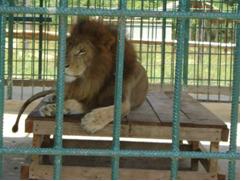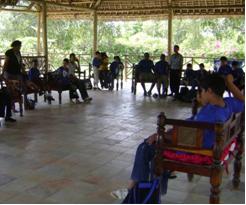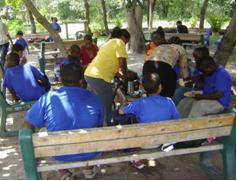Updated 17 August 2009
 The World Federation Autistic Daycare Centre organised a field trip to the Dar es Salaam Zoo on Thursday 18 February 2009 for the children. The trip was a great success and the children were extremely excited to see the various animals. The Autistic Centre was officially opened in Dar-es-Salaam, Tanzania on February 2006. The centre provides structured support for children with autism and other disabling and chronic conditions.
The World Federation Autistic Daycare Centre organised a field trip to the Dar es Salaam Zoo on Thursday 18 February 2009 for the children. The trip was a great success and the children were extremely excited to see the various animals. The Autistic Centre was officially opened in Dar-es-Salaam, Tanzania on February 2006. The centre provides structured support for children with autism and other disabling and chronic conditions.
The visit to the zoo created great excitement amongst the children. An overview of the visit is provided here:
The children were all excited and happy when boarding the bus. The bus left the school at 9:00 am with 21 children, all teachers, support staff and the administrator.
Whilst boarding the ferry some of the children got nervous, especially when they saw the bus boarding on the ferry and were worried as to how the ferry will be able to carry all the passengers and the bus across the sea to the other side. One of the aims of these field trips is to help integrate these children into the society so they are able to move around independently when they are older. However they were all relieved to be out of the pantone and back on the road.
It was quite a long drive from there up to Mji-Mwema then up to Dar-es-salaam Zoo. By 10.40 am the bus had found its way to the front gate of the zoo and the children, teachers, and supporting staff were overwhelmed with the first glance of the Dar-es-salaam Zoo at the gate. The expenses for the coach and the entrance  fees for the children was sponsored by a well wisher from the UK and the entrance fees to the zoo for all teachers and support staff was sponsored by the management of the zoo.
fees for the children was sponsored by a well wisher from the UK and the entrance fees to the zoo for all teachers and support staff was sponsored by the management of the zoo.
All the children settled down in the reception area after which the receptionist at the zoo had an announcement to make in which he briefly advised on the rules and regulations to be followed in the zoo in order to avoid any mishap and provided the teachers with brochures with a map of the zoo for ease of reference.
Finally the children were led towards the gate and it was a very exciting moment. A few steps into the zoo and the first animal seen were rabbits. All the children were fascinated to see the cute rabbits in the cage. Further up in a huge cage were different types of birds like flamingoes, crane, geese, and so much more. The children’s faces were glowing with excitement as they got to see more and more.
 The children had their break time in forodhani (dining area) garden. They were all hungry and thirsty. There were benches under big trees with camels and impalas at the background of the garden. It was a beautiful scene. All the children washed their hands and had their snacks that they had brought from home.
The children had their break time in forodhani (dining area) garden. They were all hungry and thirsty. There were benches under big trees with camels and impalas at the background of the garden. It was a beautiful scene. All the children washed their hands and had their snacks that they had brought from home.
The guide and the zoo keeper were then ready to take the children around to see wild animals such as crocodiles, monkeys, baboons, hyena, porcupine, squirrel, lizards, Savanna monitor lizards, African civet (Fungo), camel and last but not the least “Rene the Lion”.
The zoo keeper also enlightened the children on the type and quantity of food the animals consume and how frequently in a week. It was amazing to see the zoo keeper kissing and shake hands with the lion; they are very close as he feeds the lion every Sundays, Tuesdays and Thursdays. The lion eats 75 kg of meat in a week. In fact most of the animals are familiar with the zoo keeper because he feeds them, so when they see him or hear his voice then they have a sense that its meal time for them.
It was 12.30 pm and extremely hot. Almost all of the children were tired and thirsty after the long walk around the zoo and all gathered at the forodhani to collect their lunch bags and walk back to the bus.
The children were excited and tired at the same time; most of them were fast asleep in the bus, the rest were quiet and waiting to get back to school and home.
The bus arrived at the Centre at around 2:00pm and was received by eagerly waiting parents. All the children left school with lots of excitement and stories to go and tell everybody at home.
For more information, please email health@world-federation.org